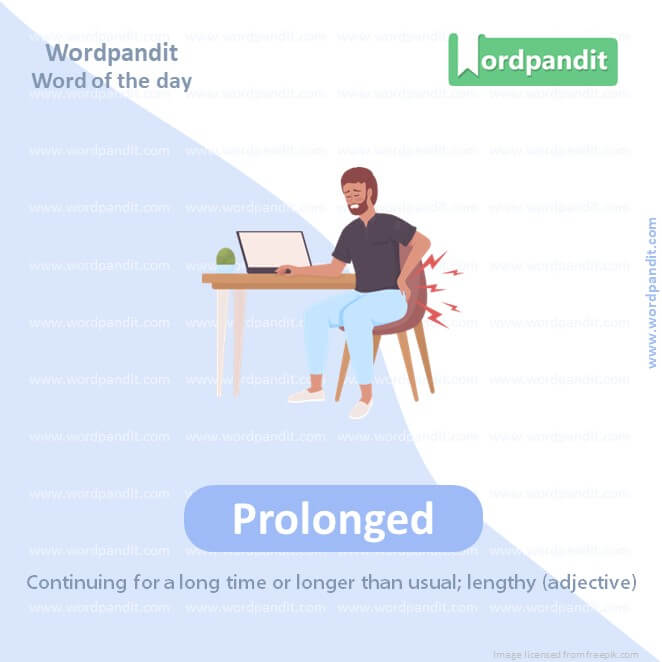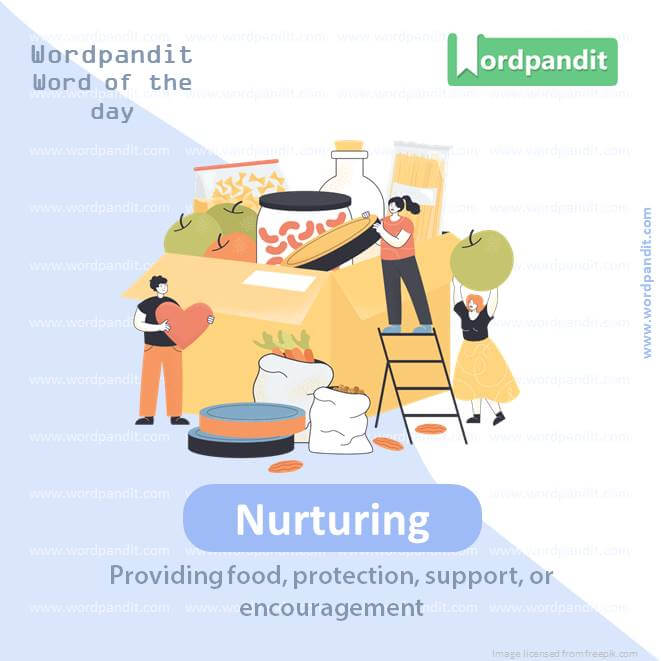Daily Vocabulary Words: List of Daily Used Words
Hi there. Welcome to this special section @ Wordpandit.
Our endeavour here is straightforward: highlighting important daily vocabulary words, you would encounter in The Hindu. This is your repository of commonly used words; essentially, we are posting a list of daily used words. Hence, this has significant practical application as it teaches you words that are commonly used in a leading publication such as The Hindu.
Visit the website daily to learn words from The Hindu.

WORD-1: PROLONGED
CONTEXT: The ADB, however, cautioned that its forecast could be proven wrong by global risks including a sharp rise in oil prices or prolonged high interest rates in the West to tackle inflation.
SOURCE: The Hindu
EXPLANATORY PARAGRAPH: When something lasts for a very long time, like waiting for a friend who’s running late for hours, we say it’s “prolonged.” It means something is stretched out or extended longer than usual.
MEANING: Continuing for a long time or longer than usual; lengthy (adjective).
PRONUNCIATION: pruh-LONGD
SYNONYMS: Extended, prolonged, lengthened, protracted
USAGE EXAMPLE:
1. The prolonged winter caused delays in planting crops.
2. Her illness resulted in a prolonged stay at the hospital.
3. The meeting was prolonged due to heated discussions.
4. They experienced prolonged periods of drought.
WORD-2: CONSPICUOUSLY
CONTEXT: Most conspicuously missing from the ADB’s report, however, was the absence of any comment on the controversies surrounding the integrity of India’s national income data or concerns raised about the heavy influence of government tax receipts on final GDP.
SOURCE: The Hindu
EXPLANATORY PARAGRAPH: Imagine someone wearing bright, colorful clothes in a sea of people dressed in black and white. They would stand out and be noticed easily. That’s what “conspicuously” means—it’s when something is very noticeable or obvious.
MEANING: In a way that attracts attention or is easily seen (adverb).
PRONUNCIATION: kuhn-SPIK-yoo-uhs-lee
SYNONYMS: Noticeably, prominently, distinctly, clearly
USAGE EXAMPLE:
1. She was conspicuously absent from the party.
2. The error in the report stood out conspicuously.
3. He spoke conspicuously louder than everyone else.
4. The new building was conspicuously different from the rest.
WORD-3: FAGGED
CONTEXT: Global country risk research firm BMI recently flagged the risk to consumption spending from stretched household savings which are near all-time lows.
SOURCE: The Hindu
EXPLANATORY PARAGRAPH: Imagine running a race and feeling completely exhausted afterward. That feeling of being tired and worn out is captured by the word “fagged.” It’s when you’re extremely tired from exertion or work.
MEANING: Exhausted or worn out, especially from physical exertion (adjective).
PRONUNCIATION: fagd
SYNONYMS: Exhausted, fatigued, drained, spent, weary
USAGE EXAMPLE:
1. After the hike, they were completely fagged and needed rest.
2. The long day of work left him fagged and unable to do more tasks.
3. She felt fagged after hours of intense exercise.
4. The team was fagged but happy after winning the game.
WORD-4: EXTRADITED
CONTEXT: Mr. Assange has faced a Swedish warrant for rape and assault, charges he denied, and the case was dropped.
SOURCE: The Hindu
EXPLANATORY PARAGRAPH: Imagine someone committing a crime in one country and then being sent back to that country to face trial. That’s what “extradited” means—it’s when someone is officially handed over to another country’s authorities for legal purposes.
MEANING: Hand over (a person accused or convicted of a crime) to the jurisdiction of the foreign state in which the crime was committed (verb).
PRONUNCIATION: ek-struh-DYT-ed
SYNONYMS: Handed over, surrendered, delivered, deported
USAGE EXAMPLE:
1. The criminal was extradited to face charges in his home country.
2. The extradition process took several months.
3. He was extradited from the neighboring country to stand trial.
4. Extraditing the suspect required legal negotiations.

WORD-5: NURTURING
CONTEXT: They need to be managed right, led by committed and enterprising individuals who can rekindle an interest in reading, drawing children, youth and adults to these libraries and nurturing an environment in homes and neighbourhoods that guides, supports and motivates readers of all ages, genders and abilities.
SOURCE: The Hindu
EXPLANATORY PARAGRAPH: Think about how plants grow when they receive water, sunlight, and care. That process of helping something grow and develop is called “nurturing.” It’s about providing love, support, and encouragement to help something or someone thrive.
MEANING: Providing food, protection, support, or
encouragement.
PRONUNCIATION: NUR-cher-ing
SYNONYMS: Fostering, supporting, cultivating, encouraging
USAGE EXAMPLE:
1. The teacher’s nurturing approach helped the students excel.
2. Nurturing a talent requires dedication and patience.
3. Her nurturing nature made her a great mentor.
4. The company’s nurturing environment fostered creativity.

WORD-6: UBIQUITY
CONTEXT: The increasing ubiquity and access of youth to smartphones, as highlighted by ASER 2023, and, earlier, the State of Elementary Education in Rural India Report, must be leveraged.
SOURCE: The Hindu
EXPLANATORY PARAGRAPH: Imagine something that is everywhere around you, like air or sunlight. That’s what “ubiquity” means—it’s when something is present or seems to be present everywhere.
MEANING: The state of being everywhere at once.
PRONUNCIATION: yoo-BIK-wi-tee
SYNONYMS: Omnipresence, pervasiveness, universality
USAGE EXAMPLE:
1. The ubiquity of smartphones has changed how we communicate.
2. His songs achieved ubiquity on radio stations.
3. The ubiquity of social media affects people’s daily lives.
4. The ubiquity of fast food restaurants is evident in every city.

WORD-7: COEXISTENCE
CONTEXT: The drama of the operation, admiration for the skills of human responders, and an acknowledgment of the struggles of coexistence.
SOURCE: The Hindu
EXPLANATORY PARAGRAPH: Imagine different animals living peacefully in the same forest, respecting each other’s space and needs. That peaceful living together is called “coexistence.” It’s about existing together without conflict or harm.
MEANING: The state of existing together peacefully or in harmony (noun).
PRONUNCIATION: koh-ig-ZIS-tuhns
SYNONYMS: Harmony, peaceful coexistence, cohabitation
USAGE EXAMPLE:
1. The town promotes coexistence among its diverse population.
2. Wildlife documentaries often showcase the coexistence of different species.
3. The coexistence of multiple cultures enriches society.
4. The project aims to promote coexistence between humans and nature.

WORD-8: RELOCATION
CONTEXT: The inevitability of conflict with wildlife, we should look for better solutions than those which focus solely on reactive capture and relocation, which have frequently proven unsustainable, or, worse, fatal to the animals involved.
SOURCE: The Hindu
EXPLANATORY PARAGRAPH: Imagine moving to a new house in a different city or country. That process of moving from one place to another is called “relocation.” It involves shifting your home or workplace to a new location.
MEANING: The act of moving or moving something or someone
from one place to another.
PRONUNCIATION: ree-loh-KEY-shuhn
SYNONYMS: Moving, migration, transfer
USAGE EXAMPLE:
1. The company offered relocation assistance to employees.
2. His relocation to the city opened new opportunities.
3. The family’s relocation to a warmer climate was beneficial.
4. Relocation is often a challenging but exciting experience.
WORD-9: MITIGATED
CONTEXT: The litmus test of an effective response and proactive conflict management systems is when a tense situation is mitigated without the need to capture or relocate an animal.
SOURCE: The Hindu
EXPLANATORY PARAGRAPH: Imagine there’s a storm, and someone takes measures to lessen its impact, like reinforcing their house or planting trees to reduce soil erosion. That’s what “mitigated” means—it’s when something is reduced or lessened in severity or intensity.
MEANING: Made less severe, serious, or painful (adjective).
PRONUNCIATION: MIT-i-gey-tid
SYNONYMS: Alleviated, reduced, moderated
USAGE EXAMPLE:
1. The new policies mitigated the effects of pollution.
2. Quick action mitigated the damage caused by the fire.
3. Her apology mitigated the impact of her mistake.
4. The medicine mitigated his pain and discomfort.
WORD-10: STRAYING
CONTEXT: This resulted in it straying into the neighbouring State days later. There was yet another attempt to ‘rescue’ him which led to its death.
SOURCE: The Hindu
EXPLANATORY PARAGRAPH: Imagine a dog wandering away from its owner during a walk. That act of going off course or getting lost is called “straying.” It’s about moving away from where you’re supposed to be or what you should be doing.
MEANING: Moving away from the correct or intended course or direction (adjective).
PRONUNCIATION: STREY-ing
SYNONYMS: Wandering, deviating, drifting
USAGE EXAMPLE:
1. The student’s straying attention affected his grades.
2. The hiker realized he was straying from the trail.
3. Her straying thoughts distracted her from the task at hand.
4. Straying from the plan can lead to unexpected outcomes.
Vocabulary Grammar
The journey of language mastery is a thrilling blend of words and structure, often referred to as ‘vocabulary grammar’. These critical components of any language work hand in hand to facilitate meaningful communication. However, embracing ‘vocabulary grammar’ requires a nuanced understanding and a strategic learning approach.
The initial step towards understanding ‘vocabulary grammar’ is to study the functionality of words in a sentence. Grammar holds the key to how vocabulary is structured in language. Therefore, observe how words change or influence meaning when placed differently in a sentence.
Leveraging diverse resources is a great way to grasp ‘vocabulary grammar’. Engage with a range of reading materials, audio-visual resources, and interactive language apps. This offers genuine exposure to ‘vocabulary grammar’ in real-world contexts and enhances comprehensive learning.
While learning ‘vocabulary grammar’, it’s important to see vocabulary and grammar as interconnected. Understanding how different parts of speech function can help in the effective usage of vocabulary. Try creating your own sentences using new vocabulary following certain grammatical rules to reinforce learning.
Revision holds its due significance in mastering ‘vocabulary grammar’. Regular review of learnt grammar rules and vocabulary ensures long-term retention and bolsters understanding. Use techniques like spaced repetition to make your review sessions more effective.
Lastly, practicing ‘vocabulary grammar’ is key to cementing your knowledge. Whether it is through writing exercises or conversing in the language, practicing allows you to apply ‘vocabulary grammar’ in a practical context and aids in accurate language use.
In conclusion, understanding ‘vocabulary grammar’ calls for conscious observation, diversified resources, interconnected learning, regular revision, and relentless practice. As you navigate this path, you will see ‘vocabulary grammar’ like two sides of the same coin, both essential to the value it holds in the wealth of language learning.







